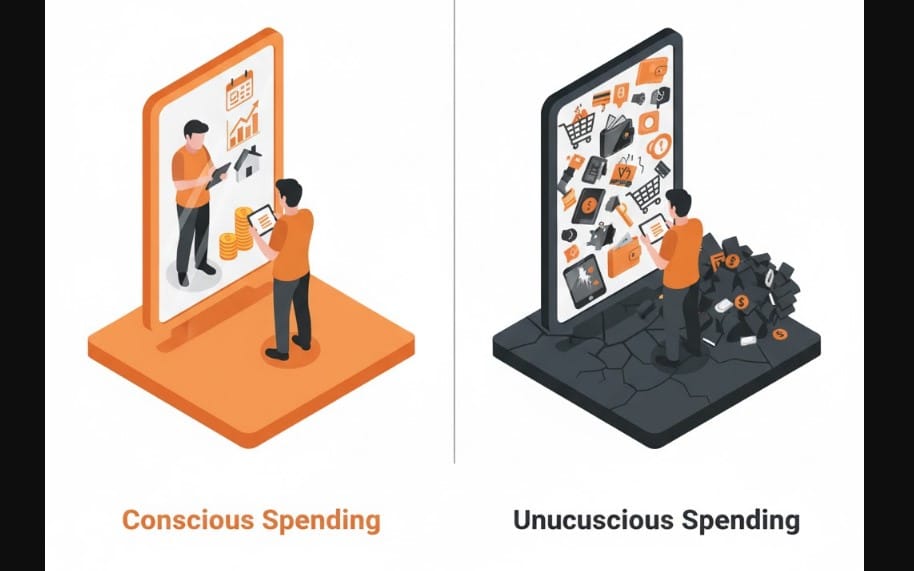Every time you swipe your card, click “buy now,” or deposit into your savings account, your spending is quietly telling a story.
Your spending isn’t just about money — it’s a reflection of your emotions, beliefs, and priorities.
Whether conscious or unconscious, the way you handle money reveals what you truly value — and what may be holding you back financially.
Understanding this mirror gives you the power to align your spending with your goals and values, instead of letting habits control your wealth.
1. Emotional Spending: When Money Speaks Feelings
Many purchases are driven by emotions rather than necessity:
- Stress relief: Buying to cope with anxiety or pressure
- Reward: Treating yourself after work or milestones
- Social comparison: Spending to keep up with friends or trends
- Fear: Hoarding or overspending to feel secure
Recognizing the emotional triggers behind your purchases is the first step to financial self-awareness.
2. Values Reflected in Your Wallet
Your spending shows what you prioritize.
- Do you spend more on experiences than things?
- Do you invest in learning or personal growth?
- Do you consistently save or invest, reflecting foresight and discipline?
Your wallet often speaks louder than your words — and aligning spending with values is a core principle of financial wellness and emotional clarity.
3. The Subconscious Money Messages
Many of us carry hidden beliefs about money that influence spending:
| Belief | Spending Pattern | Impact |
|---|---|---|
| “I don’t deserve wealth.” | Minimal saving, impulsive splurges | Blocks long-term security |
| “Money is scarce.” | Hoarding or extreme frugality | Missed opportunities for growth |
| “I must impress others.” | Luxury or lifestyle spending | Financial stress, misaligned priorities |
| “I have to work hard for everything.” | Over-earning, over-spending | Burnout, imbalance |
By uncovering these subconscious patterns, you can start rewriting your financial story.
4. Conscious Spending: Aligning Habits with Goals
Conscious spending is about making every dollar intentionally work for you:
- Budget by values: Allocate money to what truly matters
- Track triggers: Identify emotional purchases and replace them with mindful alternatives
- Invest in growth: Use spending to support education, skill-building, or wealth creation
- Pause before buying: Ask, “Does this reflect my values or my emotions?”
This practice transforms your spending from reactive to reflective and purposeful.
5. The Mirror Effect: What Your Spending Reveals About You
Think of your wallet as a mirror:
- Frequent impulsive purchases → unresolved emotional needs
- Rare spending on self-care → neglect of personal well-being
- Generous giving → strong abundance mindset and empathy
- Saving and investing → foresight, discipline, and self-trust
Your financial habits are a feedback loop. They not only reflect your mindset but reinforce it.
Change the reflection, and you change the trajectory of your wealth and personal growth.
6. Steps to Read Your Spending Mirror
- Record every purchase for 30 days
- Categorize expenses: wants, needs, emotional triggers, investments
- Identify patterns: recurring emotional or value misalignments
- Set conscious intentions: shift spending toward aligned actions
- Review and adjust monthly
Small changes compound into significant financial clarity over time.
7. Beyond Money: Self-Awareness and Growth
Spending is not just financial — it’s psychological and emotional.
Understanding your habits reveals:
- Hidden fears or insecurities
- True priorities and passions
- Opportunities for growth, generosity, and discipline
By treating your spending as a mirror, you gain insight into yourself and your future — financially and personally.
Conclusion
Your spending tells a story — about your fears, your desires, and your values.
When you pay attention, you can align your habits with your goals, reduce financial stress, and cultivate both wealth and self-awareness.
Money is a tool. How you use it reflects who you are — and who you’re becoming.


